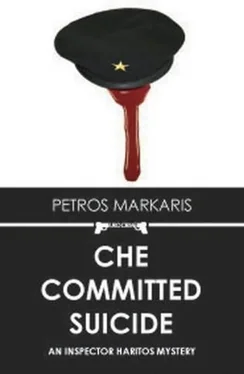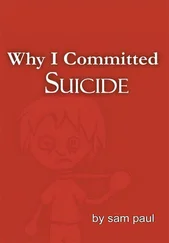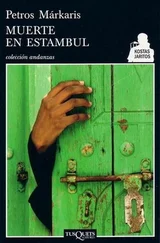Sotiropoulos allowed them to speak virtually without interruption and then, once they had vented their feelings, he dropped his first innuendo. How close had Stefanakos been with Favieros? I took my hat off to him and thought what a fool I was. It was the very first question I should have asked. The leftists were categorical: certainly they knew each other from their student years as they moved in the same circles. The other politicians minced their words. Yes the two men had known each other from the time of the Junta, but they were not sure whether they still saw each other. Besides, they were both involved in numerous activities and it was doubtful whether they kept in contact.
Just as they were trying to come to some conclusion as to whether they were still in contact, Sotiropoulos dropped his second innuendo: was it just coincidence that the two of them had committed suicide in the same way? And if it wasn’t, then what might be behind this double suicide?
It was at such moments that I realised just how effective Sotiropoulos’s aggressiveness could be, even though it got on my nerves. The others were completely nonplussed and began to stammer, trying to find some convincing answer, but Sotiropoulos didn’t let up. He asked them if they thought that there really was some scandal behind the suicides, as the newspapers were claiming. He had managed to break their unanimity and get them bickering among themselves. The Minister together with the leftists rejected the claim with abhorrence. The former because he would put the government in a difficult position if he were to answer ‘yes’, and the latter because they would be compromising their two former comrades if they were to accept some such thing. The only ones not to exclude the possibility were the members of the opposition. The Minister put forward the same theory as Petroulakis: that this was the work of the extreme right wing, just as they themselves had admitted. At that point, I started to suspect that this bullshit was slowly becoming the government line. I was expecting everyone to break into laughter, but, as usual, I was mistaken. The leftists fervently supported the same view. Only the opposition politicians were bold enough to say that the theory was a bit far-fetched, but they were attacked by the Minister, who accused them of vote-mongering from the extreme right and the eulogies very nearly turned to curses.
As I was listening to all this, I remembered Zissis. Zissis was an old leftist whom I’d met when he was a long-standing prisoner and I was a rookie copper, who had been sent for on-the-job training to the torture cells in Bouboulinas Street. Afterwards, I lost track of him and forgot about him until I bumped into him one day in the corridors of Security Headquarters. He had gone to get a certificate that would entitle him to the pension given to members of the resistance. They were messing him about and I helped him to get the piece of paper he needed. Since then we had kept in touch on and off and on a strictly personal basis. I hadn’t even told Adriani about it, perhaps because I was ashamed to admit that I had dealings with a commie. I was fairly sure that Zissis hadn’t admitted it to anyone either, perhaps because he was even more ashamed to say that he had dealings with a copper. So, our mutual shame led to mutual respect, even though it wasn’t something we ever admitted to each other.
It was nine in the morning. I had had my coffee and was getting ready to pay him a visit. I wanted to see him early, because he would have just finished watering his plants and would be in a good mood. But I was delayed by the annoying sound of the phone ringing. I picked up the receiver and it was Katerina.
‘So then, Pop,’ she said, ‘when are you going to finish this investigation so that your assistant can go home and we can all get some peace?’
‘Do you mean Koula?’ I asked surprised.
‘Yes, her. Are you aware that she’s making my life a misery?’
‘Koula? What are you on about, Katerina?’
‘Mum phones me every day and praises her to high heaven. How good she is around the house and how wonderful her baked aubergines are and how unbelievably quickly she learned to roll the vine leaves for dolmades; my confidence is shattered.’ I suddenly got what it was all about and burst out laughing. ‘Yes, you can laugh,’ Katerina went on. ‘Because so far I’ve only told you the first act, which is a comedy. But there’s a second act, where the drama begins.’
‘What drama?’
‘That’s where she starts handing out advice. That I should take stock, that I’m not only incompetent, but I don’t even want to learn the basics and how all her efforts were a waste of time, while with Koula she can see the progress straightaway… The other day, she even told me that I’d gone and found a man like Fanis, who liked his food, and I didn’t even know how to fry chips. I told her that Fanis is someone who likes his food when she cooks it for him. Otherwise he gets by on cheese and spinach pies, just like I do, so we’re a good match.’
I understood at last what the drama was. When Adriani decides to go on the attack and start pounding away, you simply collapse, like the Serbians in Kosovo.
‘I’ll tell Koula to put a stop to all the lovey-dovey with your mother.’
‘For heaven’s sake, no! I was joking!’ she shouted in alarm. ‘Let them get on with it. She’s found a substitute for me to busy herself with and she’s over the moon.’ Then she changed the conversation and asked me about Stefanakos’s suicide.
‘Don’t even ask,’ I said. ‘The bigwigs have started to get worried and I’m afraid it’s going to lead to big trouble. Ghikas is of the same opinion.’
‘Are you telling me you agree with Ghikas?’ she asked surprised.
‘Yes.’
‘For you to agree with Ghikas means that things must really be serious,’ she said and she hung up chuckling.
I stuck to the seat in the Mirafiori because of the humidity. As I turned into Vasilissis Sofias Avenue, I decided to go the top way in the hope of finding a little cool air. Driving up Mouson Street towards the Attiko Alsos, the situation was more bearable. But from the middle of Protopapadaki Street I started to feel the seat beneath me burning and by the time I had reached Galatsiou Avenue, it was just as though I had got into the bathtub with my clothes on.
Zissis lived in Ekavis Street in Nea Philadelphia. It was a narrow little street settled in by Greek refugees from Asia Minor in 1922 and it had remained just as it was then. Three streets below Dekeleias Avenue with all its banks, computer stores and mobile phone companies, you step into Ekavis Street and suddenly expect Eleutherios Venizelos to be there making one of his political speeches. The small houses were on one side of the street with front yards full of geraniums, begonias, carnations and jasmine, all planted in tubs and tin cans, and with an external staircase that led up to the house. It must have been Zissis’s family home, because when his circle of activities had closed and he started receiving his resistance pension, he had retired to this house. In Nea Philadelphia, he was a legendary figure, even to the police officers who would go to arrest him. As the years went by, however, he shut himself up more and more in his house. Most of those who knew him had died, and the younger generation knew nothing of this strange old man whom they saw buying a half a pound of feta, a few ounces of olives, two carrots and a packet of beans or lentils, the only food he ate, apart from at Easter, when he cooked roast goat with oven potatoes. His only other needs were coffee and cigarettes.
I found him watering his garden, wearing a vest, shorts and sandals. He had seen me coming towards him but pretended not to notice me. That was his usual tactic in order to show me that my visit was something of an imposition. He washed down the yard, turned off the water, coiled up the hosepipe and then, finally, turned his eyes to me.
Читать дальше












